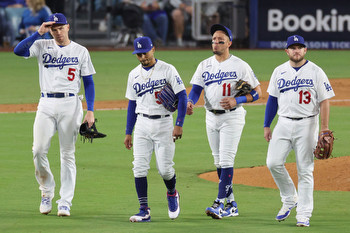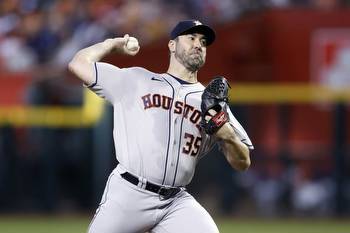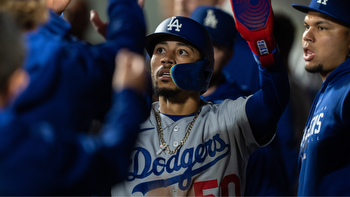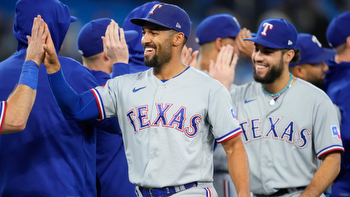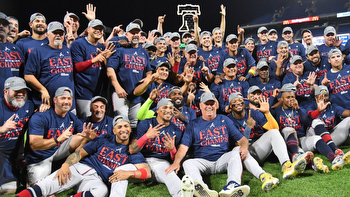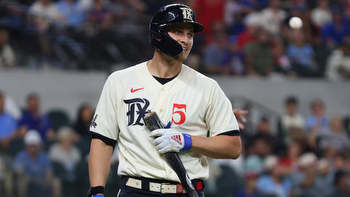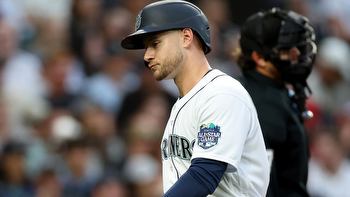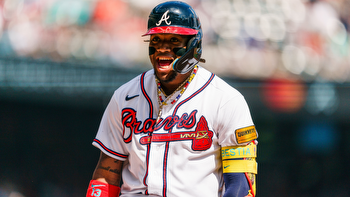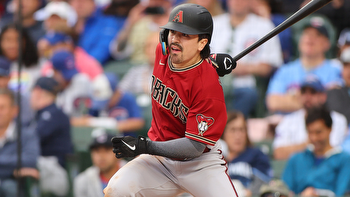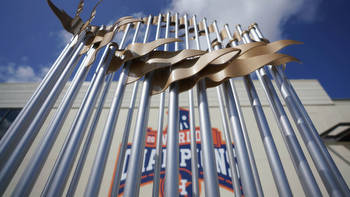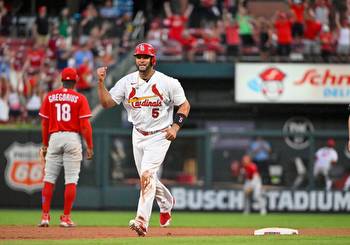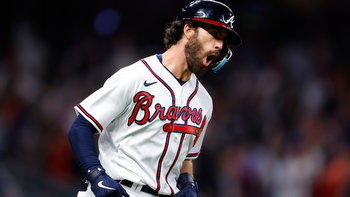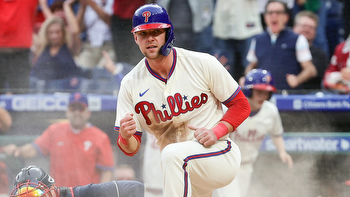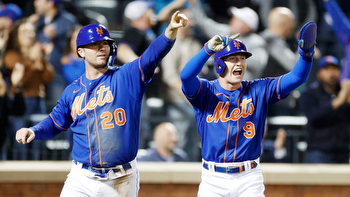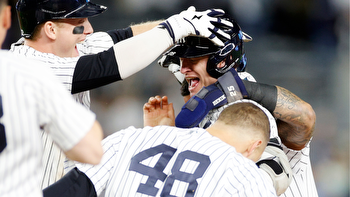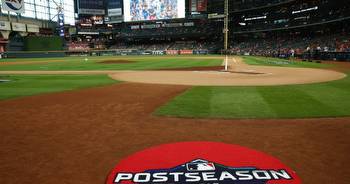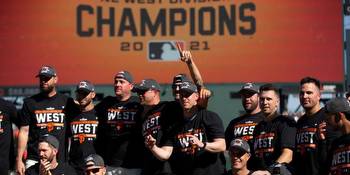Bernie: Upsets Have Always Been Common In The MLB Postseason. So Please Stop Wailing.
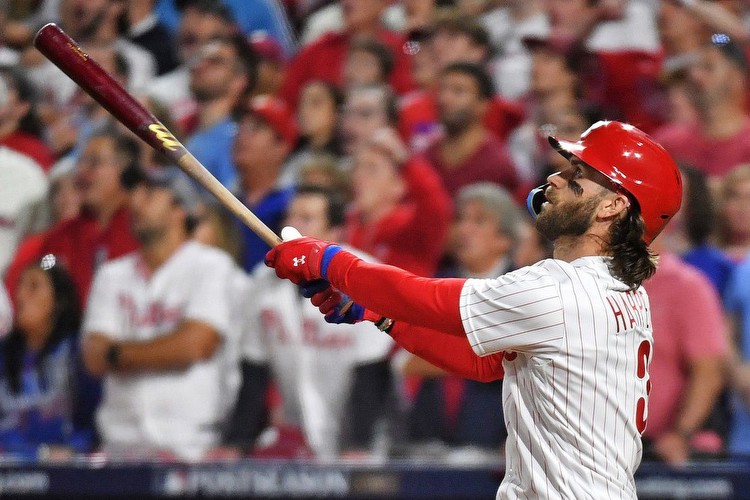
Five major-league teams won more than 90 games during the regular season. All five were escorted off the premises – rudely, I should add – and are gone from the postseason.
The Braves, Orioles, Dodgers, Rays and Brewers averaged 99 wins this season, sauntered onto the October stage, and collectively lost 12 of 13 postseason games. At least the Braves won a game; the other four were broomed out in the wild-card or division round in a humiliating expulsion. The departing palookas included three 100-win teams in the Braves, Orioles and Dodgers.
And for the first time in a season with a full schedule, the surviving teams that made the league championship series won 90 or fewer regular-season games. The Phillies, Astros and Rangers each won 90 games. The Diamondbacks managed only 84 victories. But all four semi finalists have turned into brutes this season, collectively winning 70 percent of their games on a combined 21-9 record.
Regular-season excellence didn’t extend into the playoffs or present sharp predictive insights. And while the preliminary results were more extreme in 2023, the overall trend in postseason upsets is nothing new.
The best regular-season teams get overthrown by rebellious underdogs. It happens quite often, and by now we shouldn’t be surprised. But every time one of the big clubs get sent off, the molten-take screamers and pearl-clutching old-school traditionalists get the vapors – evidently and inexplicably believing that October baseball should be protected from the brigands that rush in and subvert the powerful teams.
The caterwauling reached feverish levels over the last couple of weeks. The primary grievances: (1) MLB is letting too many pretenders qualify for the playoffs; (2) the expanded postseason format is unfair to the teams that played the winningest baseball during the regular season; (3) the super teams that dominated the during the 162-game schedule are put at a disadvantage because they must sit around and wait for five days and get stale and moldy and rusty and covered in cobwebs and barnacles during the wild-card round preamble.
Who let the riffraff in? Beginning in 2022, the postseason field was enlarged to 12 teams, six in each league. According to the self-appointed guardians of our sacred national pastime, the system is broken, baseball is ruined, and the whole damn thing has turned into a wacky Japanese game show. The gatekeepers are spending considerable time on the fainting couch to ease their emotional distress.
The so-called lesser teams have been winning the World Series for a long time, but a growing percentage of the baseball public have convinced themselves that every World Series winner must be a descendant of the 1927 Yankees to earn championship legitimacy.
Fact: During the wild-card era that began in 1995, there have been 43 teams that won 100 or more games during the regular season. Of the 43, only six won the World Series. Another six lost the World Series. That means 72 percent of the 100-win club membership have been eliminated in the preliminary rounds. And 20 of the 43 were bounced in the division round.
Fact: during the wild-card era, and through 2022, here’s a rundown of the triumphant teams that have gripped the World Series trophy:
+ 15 World Series champs won 95 or fewer games.
+ 12 World Series champs won 92 or fewer games.
+ Six World Series champs won between 83 and 90 regular-season games.
Fact: Over the past 27 postseasons, we’ve had six 100-win teams win the World Series … and we’ve had six teams prevail in the World Series after posting 90 or fewer wins during the regular season. That number will soon increase from six to seven because none of the final four teams won more than 90 games this year.
Fact: In 1969, MLB implemented the divisional format: two divisions in each league, a championship series in each league, followed by a World Series clash between the AL and NL champs. Only eight teams, total, made it to the tournament in those days – and that lasted from 1969 through 1993. There was no postseason in 1994, and the wild-card system was implemented in ‘95.
In the divisional era 25 teams won at least 100 regular-season games but only eight won the World Series. And seven teams seized the World Series after winning 93 regular-season games or less. Pretty much the same, right?
Postseason upsets happened in the divisional era, in the wild-card era and in the expanded format that’s been the model in the last two in postseasons.
Fact: According to research done by FanGraphs that includes this volatile 2023 postseason, teams with longer layoffs than their opponents are 24-11 in the first game of a playoff series. Rest is not harmful to a team’s postseason chances. Thank you FanGraphs for debunking a flimsy, false narrative.
We know all about this in St. Louis. The 2006 Cardinals won 83 regular-season games and won the World Series. The 83 wins are the fewest by the eventual champion during the wild-card era. The 2011 Cardinals won 90 games and went on a run to collect a second World Series title in six years.
Those two World Series championship St. Louis teams averaged 86.5 wins during the regular season. I don’t recall hearing anyone in this baseball-loving metropolis demand that Bill DeWitt Jr. and Tony La Russa give those trophies back and vacate the title.
The Cardinals are a good example of the crazy, unpredictable nature of postseason baseball.
La Russa’s 2004 team won 105 games but lost in the World Series. La Russa’s Cardinals won 100 games in 2005 but couldn’t get past the Astros in the 2005 NLCS. The 2015 Cardinals won 100 games but were buried by the Cubs in the division round by the Cubs. Three other postseason-bound Cardinals teams rolled up between 95 and 97 regular-season victories but failed to win the World Series prize.
That’s baseball.
Once MLB did away with a postseason setup that included only two teams – winner of the National League vs. the winner of the American League – we’ve seen a bunch of fantastic teams fall short in October. But the awesome teams have won their share of World Series, and that shouldn’t be ignored.
In the divisional era, the World Series was won by 24 teams with a regular-season winning percentage of .600 or better. And 29 World Series were won by teams that had a regular-season winning percentage under .600.
So why do we carelessly insist on using the term “upsets?”
How many true upsets are there?
Regular-season form isn’t a factor once the postseason begins.
The postseason is a new season. A separate season.
If you win enough games to claim a postseason spot, you’re bringing some good players and pitchers that are capable of lifting your team. But you can also get flattened in a hurry. All it takes is a combination of injury-related setbacks, tired or otherwise ordinary starting pitching, a vulnerable bullpen that lacks strikeout power, your best hitters turning cold, or a manager screwing up a crucial moment.
You can be great and win seven in a row during the regular season. And you can slump and lose seven in a row during the regular season. So why do we assume that these suddenly hot-cold patterns don’t apply to the postseason?
A slump in the regular season can be navigated; in most cases you have plenty of time to recover over a long schedule. But a postseason slump is especially dangerous because you don’t have much time (if any) to rebound.
The same reality applies to hot streaks. If a so-called lesser team wins a couple of games unexpectedly and with a lightning-bolt jolt, it can leave the better team shocked and deflated.
Yes, the postseason is more of a scramble now. And I hate the days off that are inserted just to appease the networks. These extra off days also helps the underdogs who have a couple of good starting pitches; they can work them more often in a postseason series that’s stretched out by unnecessary days off.
There are more hurdles now. Which means there’s a greater possibility of seeing a great team stumble, fall, and get left behind. It may be unappealing in some ways, but every team plays by the same rules.
But if you look closely at why some teams won – and others lost – it makes sense. It isn’t really surprising.
Let’s look at a few of these postseason teams in 2023:
1. The streaky Texas Rangers went off track late in the season and finished with 90 wins. That was good enough to make the playoffs, and they’re a worthy participant. How much of a surprise is it to see a team managed by Bruce Bochy win in the postseason? Considering that he’s 41-17 in his last 58 postseason games as a manager, there’s no reason to question why TEX advanced to the ALCS. And it has nothing to do with the format. It’s a team of big stars and a huge payroll and a calm, steady and confident manager that makes it all work.
2. The Rangers eliminated the 101-win Orioles, a rising team that is set for a long run of winning seasons and playoff appearances. But the O’s weren’t ready this year. The franchise hadn’t been to the postseason since 2016. They lacked a dominant presence in their rotation. The 2023 postseason was a first-time experience for a bunch of their young players.
3. The Los Angeles Dodgers … good grief. First of all, their rotation was in tatters – beat up and diminished. So this team was more vulnerable than perceived. The LA bullpen is awesome, but how do you survive a division series when your three starting pitchers – Clayton Kershaw, rookie Bobby Miller, and Lance Lynn – had a 25.04 ERA in the three-game sweep by Arizona. How can you survive that AND the collapse of big dogs Mookie Betts and Freddie Freeman, who went a combined 1 for 21 in the series? The Dodgers haven’t won a World Series in a full season since 1988. They’ve made the postseason for the last 11 years – and have been eliminated from the division round six times. Yes, this was a 100-win team in 2023 – but also a team with a weakened rotation and a haunted postseason past. The Dodgers get uptight as soon as something goes wrong. This stuff is in their DNA.
4. Arizona:classic example of a team that gets scorching hot at the right time. The lineup has a few dynamic players, the starting rotation is led by Zac Gallen and Merrill Kelly, the bullpen is throwing fire at opposing hitters, and manager Tory Luvello has made all of the right moves. D-backs are loaded with confidence. They’re 5-0 in the postseason. If the 83-win 2006 Cardinals could win it all, we shouldn’t be too startled to see the 84-win Diamondbacks get on a heater. Arizona is a streaky team but the talent is there to do this. The Diamondbacks opened the season with a 41-25 mark through the first 66 games. Soon after, they lost 15 out of 20. They had a 9-1 stretch in August that was followed by a 3-7 spell. Up and down and all around. In September Arizona had a four-game winning streak and a five-game winning streak. And they also dropped their final four regular-season games.
They’re incredibly unpredictable – but that can work both ways, both good and bad. During the four-game skid at the end of the regular season, Arizona batted .149, scored three total runs, and didn’t homer in 121 at-bats. But in winning five consecutive postseason games over the Brewers and Dodgers, the Diamondbacks crushed 13 homers in 168 at-bats, slugged .530, and averaged 6.0 runs per game. When these dudes get hot, run for the hills.
5. Milwaukee’s offense is a drag. The Brewers won 92 games and the NL Central title. But the same problem brought them down again. The smaller-market Brewers have payroll limitations that create a roster strategy centered on pitching and defense. That’s where a lot of the money goes. That leaves the Brewers limited – offensively malnourished – in their recent postseason. Averaging only 1.9 runs per game, the Crew has lost nine of their last 10 postseason games. So why should we be surprised by another no-show by their offense?
6. Tampa Bay’s offense has vanished. Last postseason the Rays scored one run in two games and were swept by Cleveland in the wild-card round. This postseason the Rays scored one run in two games and suffered a sweep by Texas. When you play four games over two postseasons and score two total runs and bat .161 in 152 plate appearances, what do you think is going to happen? In both instances, the Rays didn’t have the dreaded layoffs that so many people whine about. The format had nothing to do with their demise. They didn’t hit. And this time around, Tampa Bay manager Kevin Cash made some odd, damaging mistakes in getting owned by Bruce Bochy.
7. The Braves? Go figure. But there are reasons for the failure. But their starting pitching wasn’t strong as they entered the NLDS matchup against the Phillies. Spencer Strider wasn’t bad in his two starts, but Max Fried (blister) pitched poorly in his first start since Sept. 21. With Charlie Morton injured and unavailable the Braves had to turn to Bryce Elder for Game 3 – this, after Elder had been smoked for a 5.26 ERA in his last 10 regular-season starts. The bottom line: a 6.05 ERA and seven home runs allowed by the Braves starter over the four games.
The ATL hitters let the pressure get to them. During the regular season Ronald Acuna Jr., Matt Olson, Ozzie Albies and Marcell Ozuna collectively slammed 168 homers and drove in 454 runs. In the four-game series against the Philly, the same four hitters combined to bat .207 with no home runs and one RBI.
This team went from full confidence to little confidence in no time. Too many of their bangers got quiet in the Philly series. And the Phillies are a bad matchup for Atlanta
8. The Astros will be making their seventh consecutive appearance in the ALCS. Incredible. And since the cheating scandal and that led to dismissals and penalties, the Astros are 31-15 in the postseason since Dusty Baker was brought in as manager in 2020. This is the norm. It’s funny how all the mewling about great teams having to sit around and wait to start playing postseason games didn’t affect the Astros – last season, or this season. After all of this supposedly harmful “sitting around” delays, Houston had a combined 6-1 record in their last two ALDS series.
9. The Phillies sure look like a team that’s constructed for the postseason. There are two terrific starting pitchers in Zack Wheeler and Aaron Nola and an underrated third starter in Ranger Suarez. The bullpen is stocked with dudes who throw 97 mph. The lineup is loaded with power hitters. And home runs are HUGE in postseason baseball; in the first two rounds this year, the team that out-homered their opponent are 11-1.
Accordingly, the Phillies are trying to bomb their way to a second consecutive NL pennant. They pounded the Braves for 11 home runs in four games and have 13 in their six postseason games. Going back to the 2022 postseason, the Phillies have launched 37 homers in 17 games.
And let’s straighten out something else: Philadelphia is better than your typical 90-win team. Since June 3, Philly has gone 70-41 for a .631 winning percentage.
And the Phillies clearly have rattled the Braves in the last two postseason matchup. Is it shocking? Hell, no. The Phillies crave the big stage and it emboldens them. Atlanta turns shaky.
“I think there’s something special about October baseball,” Phillies catcher J.T. Realmuto told The Athletic after Thursday’s series-clinching win over Atlanta. “And to see the teams that thrive in this environment and thrive with this much pressure, when the games mean so much, there’s so much more focus involved in the postseason.
“It’s hard to get that focus for a 162-game regular season. So to see, in my opinion, the teams that thrive here and play well in this situation, I mean, that’s what baseball is all about. That’s what you play for.”
The Braves are lethal during the regular season, but you have to prove yourselves all over again during the postseason. And the Phillies took down the Braves for the second straight postseason.
The Phillies have outscored the Braves 50-21 and out-homered them 16-8 over in the last two NLDS rounds. The Phillies had the advantage at manager, and the pitching was a no-contest rout. In the eight postseason games they’ve played against each other in the last two Octobers, Philadelphia pitchers had a 2.44 ERA and Atlanta had a 5.16 ERA. This wasn’t about the format and it isn’t a fluke. Phillies bring their best for when it matters most.
THE PICKS FOR THE LEAGUE CHAMPIONSHIP SERIES
I’ve been crummy at this. But for what it’s worth — not a lot — I’ll go with Philadelphia over Atlanta in the NLCS, and Texas over Houston in the ALCS.
Thanks for reading …
–Bernie
Bernie hosts an opinionated sports-talk show on 590 The Fan, KFNS. It airs 3-6 p.m. on Monday through Thursday and 4-6 p.m. on Friday. You can stream it live or access the show podcast on 590thefan.com or through the 590 The Fan St. Louis app.
For weekly Cards talk, listen to the “Seeing Red” podcast with Will Leitch and Miklasz via 590thefan.com or through your preferred podcast platform. Follow @seeingredpod on Twitter for a direct link.
All stats used in my baseball columns are sourced from FanGraphs, Baseball Reference, StatHead, Baseball Savant, Fielding Bible and Baseball Prospectus unless otherwise noted.

